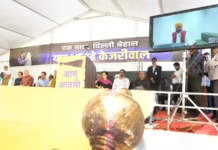Changing pattern & techniques of Polo over the years
Dr Jaswant Singh Puri*
During the years many variants in the game of Polo have developed. While some of them are very close to the conventional method of playing, others are quite different. Various variants of polo game are discussed hereunder:
BEACH POLO, INDOOR POLO & PADDOCK POLO
These polo variants are governed by the same rules and regulations as those of the convention polo game. The two teams riding on horses battle by striking a polo ball with the bat constructed out from the stem of a raspberry or blackberry. The size of the bat depends upon the size of the pony .The polo ball must reach the middle of the goalposts situated at an extreme ends of the rectangular polo ground. Every player wears self-defense systems such as kneepads and a hap, sometimes with a steel mask for the face.

The traditional polo team consisted of four players. The game of polo was divided into four to eight ‘Chukkers’, i.e the periods of seven minutes each. The horses are replaced between the chukkers for providing them rest. In the traditional polo, very intense turns, breakings and accelerations were involved. One Polo player needs minimum of two horses. In the high goal matches six to eight horses are required for every polo player. The huge polo ground (three hundred yards long and one hundred and sixty yards wide) is required, as well. The Polo ball has a diameter of 8.5 cm and is made of resin or wood. The polo horses graze and rest during winter. The same are in action during the summers – the polo season.
ARENA POLO
The parent polo rules and regulations are applicable to Arena Polo, the ground for which is smaller in comparison to the traditional polo ground and is made up of dirt or sand. The Arena Polo match consist of four chukkers. The ball having 12.5 cm diameter is prepared of pure leather. The Arena Polo team consists of three players. The sideboards, approximately four feet high, surround the Arena Polo field. The polo field is prepared to keep the ball in motion. In Arena Polo usually only two chukkers are played by the horses. The participants replace horses between chukkers in Arena Polo.
BEACH POLO
Beach Polo is very close to Arena Polo. The teams in Beach Polo consist of two/three players and play ‘Chukkers’ of four to seven minutes. The Beach Polo Ground consists of sand arena. The ground for Beach Polo is placed on a beach. Four feet high sideboards surround the Beach Polo Ground. After each chukker, the players replace the horses. The Arena Polo ball is used in the Beach Polo game.

Rashid Al Habtoor, Chairperson of the Dubai Polo and Equestrian Club, and Sam Katiela started the Beach Polo in Dubai in 2004 .This was followed by the Miami Beach Polo World Cup in 2005 in the United States. Many matches and tournaments have been played thereafter in Australia, Argentina, Belgium, Austria, Colombia, Chile, France, England, India, Germany, Mexico, Italy, Spain, Poland, Uruguay and The Netherlands.
The International Beach Polo Association was founded in the year 2008 by its founder Chairman Alex Webbe. The International Beach Polo Association website is: internationalbeachpoloassociation.com
INDOOR POLO
The rules and regulations as those of Arena Polo are followed in Indoor Polo. The only difference is that the Indoor Polo Ground has a roof on the top.
PADDOCK POLO
Each Paddock Polo team has three players and they do not change ponies during two Chukkers (of ten minutes each) of the match. The Paddock Polo ball is same as that of Arena Polo. It can be played on all the fields and during all the seasons. The riding school horses specially developed for events like jumping and dressage are used for playing Paddock Polo.

In France, the Paddock Polo is very popular and there are around one thousand Paddock Polo players in France. In Valenese (France), the second biggest annual tournament of Paddock Polo takes place during which twenty four teams and around three thousand spectators gather annually. Many universities of France maintain Paddock Polo disciplines. Which too are invited to participate at Chantilly, Lyon or Aix en Provence.
SNOW POLO
Snow Polo is played by keeping the ball in play on an arena packed with snow surrounded by recommended fencing. The teams consist of three players, while the game has four ‘chukkers’ of seven minutes each. The Polo horses are decorated with special shoes for achieving better traction. The Snow Polo ball is made of bright red color plastic and is designed in such a fashion that it can be easily spotted in the snow.
The Snow Polo Sport was first launched in the year 1985 at the resort town of St. Moritz in Switzerland – one of the earth’s most chic hilly sports stations. The curious spectators from all over the country entertained the event. The competition for St Moritz Cup Snow Polo is held in January on a snow covered rugby field.
The Snow Polo tournaments also take place at Megeve, Val D Isere in France as well as at various other hill resorts of Italy, Germany, Austria, Chezc Republic, Poland, USA, Argentina and China.
PONY POLO
The Pony Polo is played by eight to eleven years old children mounted on ponies shorter than one meter.

BIKE POLO
The Bike Polo – played riding the Fixie Bikes (the bikes without brakes) – originated in the end of nineteenth century. Less fortunate and younger generation plays it on grass. It is different from the traditional polo sport. It is played in the United Kingdom, the United States of America and France. It is governed by very few and simple rules and regulations. It is played by two teams of three players each. In this sport when the Bike Polo Player is touching the ball, his feet cannot touch the ground. During the duration of this sport the one hand of the Bike Polo Player holds the handle of the Bike and with the other hand the Bike Polo Player holds the mallet (Polo Bat).
ELEPHANT POLO
The members of British Aristocracy for the first time played the sport of Elephant Polo in India at the end of Twentieth century. It is played in Thailand, Nepal and Sri Lanka. In the beginning the Soccer Balls were used to play Elephant Polo. But, after detecting that the Soccer Balls were smashed by Elephants, the standard Polo ball replaced the soccer ball.

The Elephant Polo Sticks are constructed of cane and have a standard Polo cigare on the end. The height of the Polo stick is according to the size of the elephant —It varies from Nine to Six feet. In Elephant Polo, the Mahout manages the elephant under instructions from the Player riding it.
SEGWAY POLO
The horse Polo is similar to Segway Polo and is played by two teams of five players each. The player, instead of riding a horse, rides a Segway PT. The rules and regulations of Segway Polo have been adopted from Bicycle Polo and Horse Polo.

On Eleventh July, 2004, the five members of the Bay Area Segway Enthusiasts Group or Bayseg played the first sport of Segway Polo in the San Francisco Bay Area. It is popular in the USA, Germany, Sweden, Austria, Barbados and New Zealand.
*The writer is Patiala based Journalist













